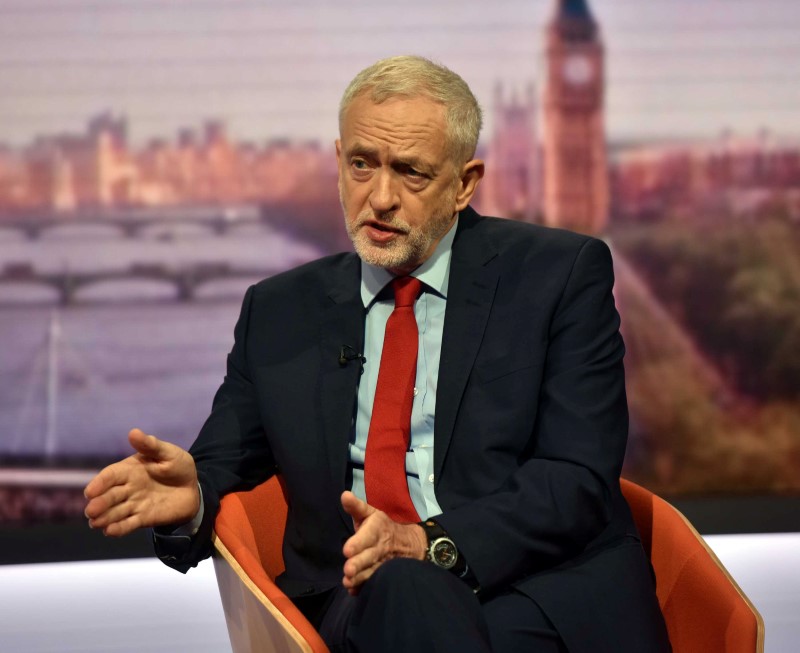By Andrew MacAskill, Anjuli Davies and William James
LONDON (Reuters) - Britain's left-wing opposition party has held a series of meetings with top finance executives, setting out how it would levy taxes on one of the world's biggest financial trading centres if it snatched power from Prime Minister Theresa May.
With May's grip on the leadership weakened by an ill-judged election last month and her Conservative party divided over Brexit, Labour is hoping her minority government will collapse and catapult its socialist leader Jeremy Corbyn into power.
Last week, Labour's finance spokesman John McDonnell chose the London Stock Exchange -- a bastion of British capitalism -- to invite feedback on proposals, telling leaders his party will form the next government, sources at the meeting said.
Banks in London's financial hub had paid little attention to relations with the Labour Party since 2015 when members elected Corbyn, a veteran campaigner who is seen as opposing much of what the City of London stands for.
But the industry has been forced to take the party seriously after its much stronger than expected showing in the general election which left May to rely on the support of a small Northern Irish party to prop up her government.
McDonnell told executives from Standard Chartered (LON:STAN), the London Stock Exchange, the City of London Corporation, lawyers, lobbyists and accountants in two separate meetings last week about Labour's proposals to expand an existing tax on shares to include trading on other assets such as bonds and derivatives.
Labour says the tax -- proposed to be around half of a percentage point or less on the value of a trade -- could earn 4.7 billion pounds a year.
Labour published details of the tax in the run up to the June election.
Banking industry figures are concerned such a tax, debated in Western economies for decades, could exacerbate the impact of Brexit by prompting more businesses to flee London.
CUTTING DOWN TO SIZE
Avinash Persaud, an economist and a former hedge fund manager, whose work is the inspiration for the proposal and appeared alongside McDonnell at one of the events, says Britain's finance sector is lightly taxed.
Persaud said the tax would help kill off high-frequency trading and he favours reducing the size of Britain's financial sector because it has become too large.
"I do feel there is a right size for the financial sector and in some countries it is too small, but in Britain and America, in the Anglo-Saxon countries, I do think it is too large," Persaud told Reuters in an interview.
"This means it is absorbing a lot of resources and as a result it becomes a very powerful player, a very powerful player in politics and is maybe exerting a disproportionate impact."
Labour wants to use the higher taxes on financial services -- Britain's most profitable industry -- to fund increased public spending and end seven years of austerity under the ruling Conservatives.
The proposed levy would be based on a tax of 0.2 percent of the value of trades for banks, hedge funds and other financial companies, and 0.5 per cent for non-financial businesses.
Britain has the largest foreign exchange market and the second largest derivatives market in the world, accounting for just under 40 percent of the world's dealings in those markets, according to the Bank for International Settlements.
DAMAGE FEARED
One executive who attended one of the Labour meetings said the proposals would damage London at time when its status is under threat because of Brexit.
"If they win power and actually go ahead with this, this would be the straw that breaks the camel's back," according to the executive.
Richard Benson, the co-head of portfolio investment at currency managers Millennium Global, said such a proposal would likely send a lot of trading activity away from Britain.
"It is the selective advantage that is the problem with this, unless everyone else does it, people just leave," said Benson, who was not at the meetings.
But the Labour Party's City spokesman Jonathan Reynolds told Reuters although he has been sceptical in the past about a transaction tax it would help reduce anger towards banks for causing the financial crisis and raise revenue.
Banks "need to continue to rebuild public trust and support, and the tax contribution from the sector is a significant part of that," he said.
The head of one large investment bank in London said they are seeking to secure meetings with Labour's senior team as they are a potential ally in pushing for a softer Brexit and to find out more about their policies.
"We need to have some sort of dialogue with Labour because it's been zero," the banker said.
Some bankers predicted that if Labour were to be elected, it would adopt a more centrist approach like former French President Francois Hollande or Greek Prime Minister Alexis Tsipras.
Another executive who attended one of the meetings with McDonnell said it was made clear that Labour was inviting reaction to the proposals.
"They are actively encouraging feedback and wanting to meet people further to discuss feedback. I thought that was a very positive message," he said.
Others warned though that there has been little so far from the party's rhetoric to indicate a major softening in tone.

If Labour comes to power then "it is literally game over for the UK, welcome to Venezuela without the sunshine," another banking executive said.